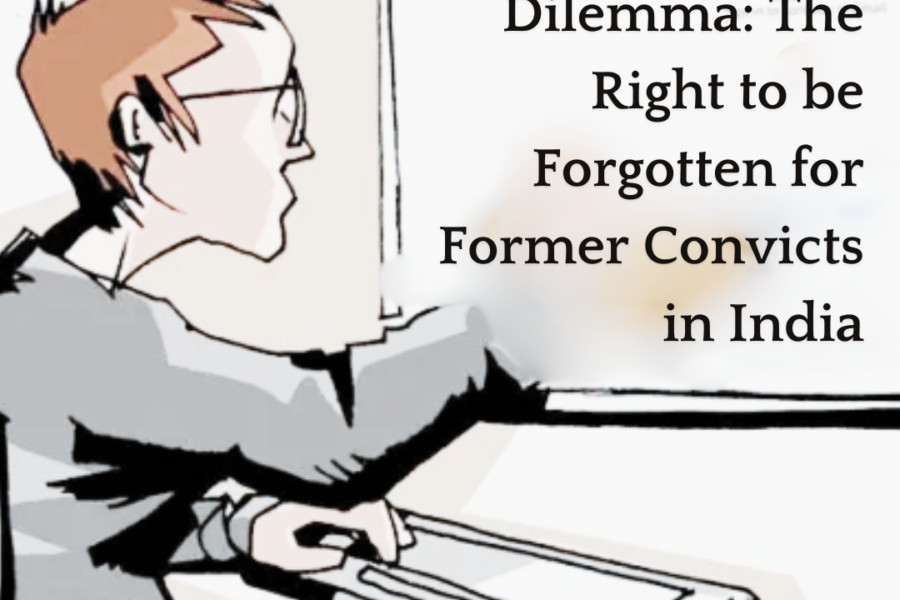Introduction:
In the digital age, where information propagates at an unprecedented pace, the notion of erasing one’s virtual footprint has become an intricate and multifaceted challenge. The concept of the “Right to be Forgotten” (RTBF) has emerged as a contentious legal principle, seeking to strike a delicate balance between an individual’s privacy and the public’s right to access information.
At the heart of this discourse lies the intricate debate surrounding the rehabilitation of former convicts and the extent to which they should be afforded the opportunity to move beyond their past transgressions. This deliberation raises profound questions about the intersection of individual autonomy, societal reintegration, and the preservation of public records, necessitating a careful examination of the underlying principles and competing interests.
The RTBF in India:
– In India, the Digital Personal Data Protection Act (DPDP) incorporates the RTBF in a limited sense, granting individuals the right to correct, complete, update, or erase personal data previously consented to for further processing.
– However, this right of erasure is subject to limitations, including instances where the data is necessary for compliance with specific laws.
Jurisprudential Landscape:
The jurisprudence surrounding the RTBF in India has been marked by a series of judgments that have attempted to navigate the intricate terrain of individual privacy, public interest, and the maintenance of transparency in the judicial system.
Karthick Theodre v. Registrar General (2021):
– This case addressed the scope of the RTBF’s application for accused individuals who have been acquitted.
– The Madras High Court recognized the need to balance “the right to privacy of the petitioner” with “the right to information of the public and the maintenance of transparency in judicial records.”
– While initially granting interim relief, the court ultimately reversed its decision, acknowledging that a broad application of the RTBF for accused persons would contradict public policy.
– The court’s reasoning underscored the delicate equilibrium that must be struck between individual privacy concerns and the public’s right to information.
International Perspectives:
Comparative jurisprudence from other jurisdictions offers valuable insights into the nuances of applying the RTBF in criminal cases.
– Argentina: Employs the principle of “effective knowledge,” holding intermediaries liable only if they have been notified of harm and failed to act.
– European Court of Justice (Google Spain case): Recognized the role of search engines in exacerbating infringements on fundamental rights and adopted the concept of “practical obscurity.”
Spent Convictions and Past Acquittals:
The application of the RTBF in the context of spent convictions and past acquittals remains a complex terrain.
– Various jurisdictions have developed criteria to balance privacy interests with public freedom of expression and the right to know, considering factors such as:
– Passage of time
– Severity of the offense
– Individual’s occupation
– Enduring public interest in certain types of information
Rehabilitation and Reintegration:
– The United Kingdom’s Rehabilitation of Offenders Act of 1974 provides a framework for individuals to present a clean record after a specified period, facilitating reintegration into society.
– Conversely, in Japan, the Supreme Court has denied the RTBF in cases involving serious criminal conduct, emphasizing the enduring public interest.
Fundamental Questions and Societal Imperatives:
– The debate surrounding the RTBF and its application to former convicts raises fundamental questions about the boundaries of individual privacy, the role of public records in maintaining transparency, and the societal imperative of facilitating rehabilitation and reintegration.
– Rehabilitation and reintegration should be viewed not merely as individual pursuits but as societal imperatives that contribute to the overall well-being and stability of communities.
Challenges and the Path Forward:
– Implementing the RTBF in criminal cases necessitates a nuanced approach that considers the severity of the offense, the passage of time, and the enduring public interest.
– Achieving a balance requires collaborative efforts among legislators, the judiciary, and relevant stakeholders to develop clear guidelines and procedures for assessing RTBF requests.
– The role of intermediaries, such as search engines and online platforms, cannot be overlooked, and establishing clear guidelines for their responsibilities and liabilities will be essential.
Conclusion:
The debate surrounding the RTBF and its application to former convicts is a complex and multifaceted one, requiring a delicate balance between individual privacy, public interest, and the imperatives of rehabilitation and reintegration. While the path forward is challenging, it presents an opportunity for legal systems to evolve and adapt to the realities of the digital age, ensuring that justice and fairness are upheld while preserving the principles of transparency and accountability.
Contributed by-
Saachi Minocha
National Law University, Jodhpur (2023-28)


I always feel valued and heard at this pharmacy.
can i order generic lisinopril without a prescription
Their digital prescription service is innovative and efficient.
Some trends of drugs.
safe way to come off gabapentin
The best place for health consultations.
A true gem in the international pharmacy sector.
where to buy cheap clomid online
They offer invaluable advice on health maintenance.
Actual trends of drug.
where can i get cheap clomid without prescription
They handle all the insurance paperwork seamlessly.